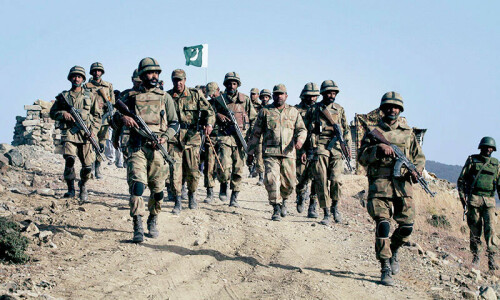WASHINGTON, Nov 18: The incoming Obama administration has been advised to bring a “dramatic strategic shift” in US policy towards Pakistan, moving away from knee-jerk reactions to security threats to building a ‘partnership for progress’ with the South Asian nation.
The new approach, proposed by a think-tank headed by Barack Obama’s chief adviser, also seeks greater US involvement in resolving regional disputes.
The study argues that no effort to bring stability to Pakistan will succeed unless the United States recognises that Pakistan’s multiple internal challenges extend beyond its borders and have a wide-ranging impact on regional and global stability. “Just as conditions in Afghanistan, India, Iran and Central Asian countries affect Pakistan, events in Pakistan shape its neighbours,” the report observes.
The Centre for American Progress, headed by John Podesta who also heads Mr Obama’s transition team, urges the incoming US administration to work with Congress and the international community to help Pakistan accomplish the following goals in the next decade:
* Weaken Al Qaeda, the Taliban and affiliated militant groups so that they no longer threaten stability in Pakistan, Afghanistan, India, the broader region, the United States or the world.
* Secure borders between Pakistan and its neighbours, with all border disputes including Kashmir and the Durand Line, either resolved or in a credible process for resolution.
* Foster a stable internal political system that is based on the inclusive participation of all Pakistani citizens, civilian oversight of key security and intelligence agencies, and governing authorities that respect basic human rights.
* Create an economy that is growing, integrating with the global economy, and providing for the needs of its citizens.
The report notes that the lawyers’ movement and a thriving media are increasingly calling Pakistan’s leaders to account and demanding action on behalf of the Pakistani people. “These forces have the potential over time to influence their leadership to address their leading concerns, including unemployment and inadequate education, as well as to demand a strengthening of civilian government institutions,” the report adds.
The Centre for American Progress conducted this year-long study with the help of US-Pakistan Working Group, which includes 33 of Washington’s top Pakistan specialists. The authors expect the Obama administration to base their Pakistan policy on the principles proposed in the study.
Besides, Mr Podesta, at least two of the report’s four co-authors -- CAP’s Brian Katulis, a Middle East and South Asia specialist, and Lawrence Korb, a senior Pentagon official under Ronald Reagan -- are likely to get senior posts in the new administration.
The working group includes Jonah Blank, vice president-elect Joseph Biden’s top South Asia staffer on the Senate Foreign Relations Committee, and Bruce Riedel, a member of the US National Security Council in the Clinton administration. Both have been among the Obama campaign’s key advisers on South Asia.
The 71-page report, ‘Partnership for Progress’, comes amid growing concern in Washington about the situation in Pakistan and notes that the Taliban brand of radicalism has spread outward from Fata into the NWFP and beyond even into Punjab and other parts of Pakistan’s heartland.















































Dear visitor, the comments section is undergoing an overhaul and will return soon.